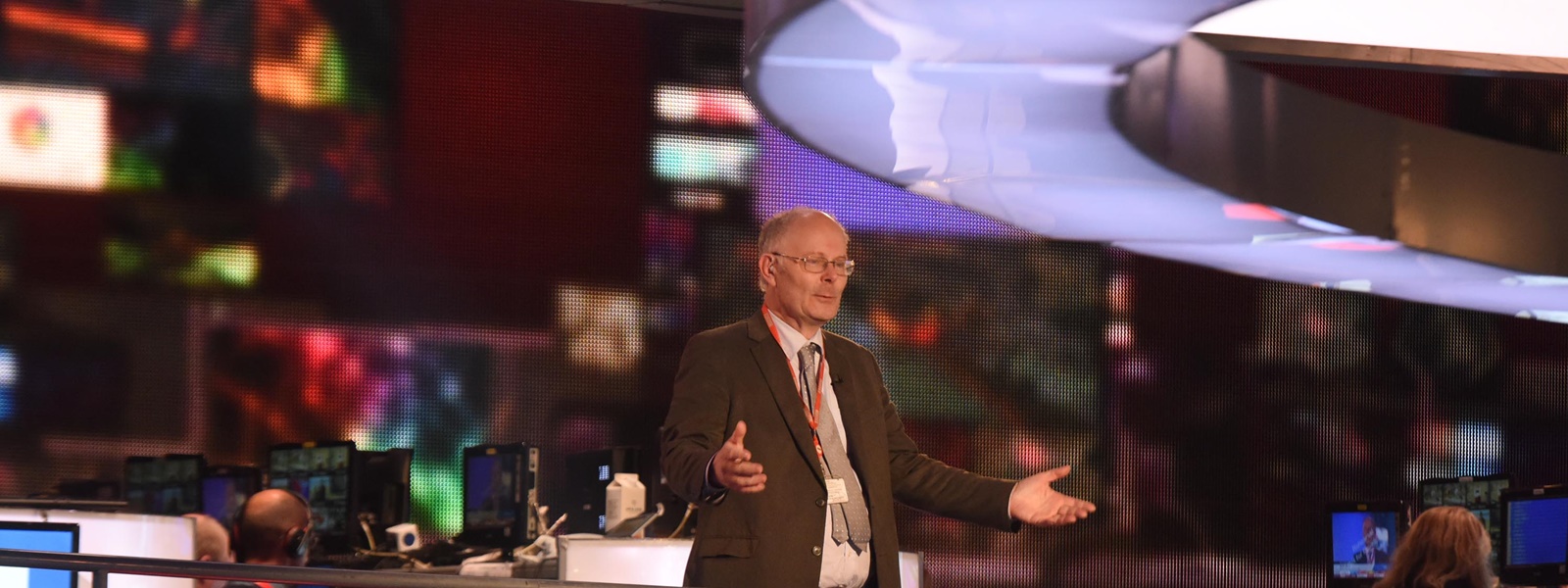Strathclyde People 2018
Sir John Curtice, Professor of Politics at the University of Strathclyde, is one of the UK’s best known political scientists – a leading voice in social attitudes and electoral behaviour. He’s worked with the University since 1989, having witnessed the development of devolution, the independence referendum come and go, and political scandals sweep the country in an eventful 30 years.
Throughout his career, Sir John’s been involved in a huge amount of BBC election coverage. Here’s that breakdown:
- 10 UK general elections
- 8 European Parliament elections
- 6 Scottish Parliament elections
- 5 UK and devolved referendums
- 29 local elections
One quick online search and you’ll find countless publications, numerous television and radio appearances, and a growing social media following dubbed ‘the cult of Curtice’. We wanted to find out more, like what attracted him to our university? And how does he feel about becoming Sir John?
Starting at Strathclyde
It was during a brain drain to the US that I was headhunted by the Head of the Politics Department at the University of Strathclyde. The department was pretty small at that time and its principal number cruncher was going to the States.
Accepting was easy. It’s been a leading politics department since the 1960s, one of the first in the country to embrace the so-called ‘behavioural revolution’ (the idea that politics should be studied by analysing how people behave politically rather than just the constitutional rules). Being in an environment where quantitative methods were in the DNA, as opposed to a bit of an add-on, was really attractive to me – and still is.
Nearly 30 years on
Crucially, the University has offered an environment for useful learning – and accepts the implications of that mission. If you’re going to engage in useful learning, you need to participate in the outside world. I spend a lot of time working with NatCen SocialResearch and maintaining an association with the BBC that goes back 40 years.
My advice to anyone seeking to stay in academia would be: remember that universities are heavily funded by the tax payer, so there’s a responsibility to give back to the society in which you’re embedded. That, in part, has to involve some degree of learning the art of communication and sharing your ideas with the outside world.
Becoming Sir John
A letter arrived from the Cabinet Office in November last year, which didn’t seem out of the ordinary – I very occasionally get letters from government departments. My first thought when I realised I was getting a knighthood was: well, I wasn’t expecting this! I had to keep it quiet for a while – even when a friend joked that I’d be next in the running, which I had to pass off as complete nonsense.
The reaction when the news was announced was positive, a lot of people were extremely kind about it. Even many of those who aren’t particularly enamoured with the honours system were very gracious. It’s very affirming, really. People are basically saying you’re doing a good job.
A lifetime achievement
The Times Higher Education Lifetime Achievement Award came as another surprise!
I suppose the reason I was deemed worthy is that people say they quite enjoy it when I’m on the television or radio, that I make things clear. And evidently they feel that, in a mildly entertaining way, I bring to the table something that others don’t. Meanwhile, I have had a significant role in things like the principal academic study for voting behaviour in the UK, and the major British Social Attitudes survey.
I guess it’s a bit of a double-edged sword when people start giving you lifetime achievement awards. They’re sort of telling you something about your age…
Coming up next
Brexit is keeping me busy! Before the Scottish independence referendum, I launched a real-time website called What Scotland Thinks, which brought together polling information, blogs and analysis of public attitudes to the constitutional debate in an easy, searchable format. I’m now doing something very similar for Brexit. I’m also analysing the impact Brexit has had on the pattern of support for political parties. Both of these are very live themes, so I’m constantly out talking to people.
Beyond that? Well, I’ve no immediate plans to retire. I’m nearly 65, but as long as my health sustains and – broadly speaking – I can carry on doing what I’m currently doing, I’ll be here. Sitting and typing away on my word processor is my idea of heaven!

